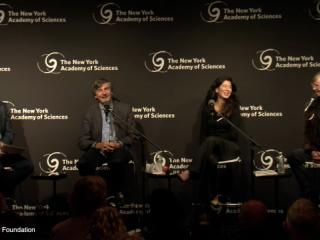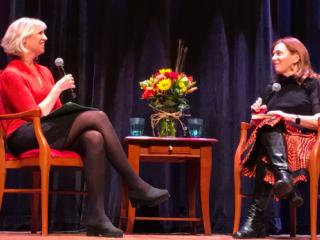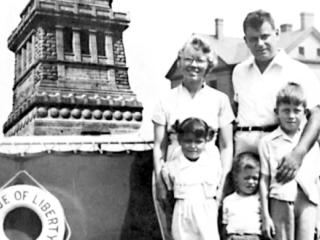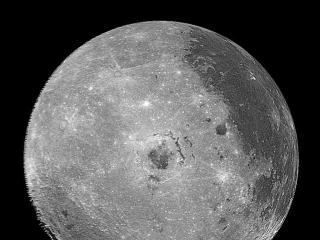The Sorrel-Weed House has been called the “most haunted house” in Savannah, Georgia, and its “ghost tour” is a big tourist attraction. But historian Tiya Miles found another story of slavery and racial stereotypes buried in this history.More
Interviews By Topic
Steve asked a panel of experts— social psychologist Michelle Shiota, writer Caspar Henderson, and astrophysicist Alex Filippenko — to unpack the emerging science behind the emotions of awe and wonder, including their role in our ongoing quest for understanding and knowledge.More
Listener Jonathan Blyth sent us a ghost story that might make you think twice about what — or whom — is on your plate.More
Lorrie Moore — one of the best short story writers in the world — is a master of bringing a character to life in just a few words. She spoke to Steve about bringing characters to life in her collection called “Bark.” More
In her book "On Immunity: An Inoculation," social critic Eula Biss explores the metaphors and myths hidden behind vaccine hesitancy.More
How A Novel About 'Monster Dogs' Can Help Us Rethink Our Relationship with Our Own Canine Companions
Kirsten Bakis first wrote her story of biomechanically-enhanced, hyper-intelligent dogs 20 years ago, and it’s been a cult favorite ever since. So why create a post-modern Frankenstein story with dogs at the heart of the tale?More
Anne recently interviewed author Susan Orlean on stage at the National Writers Series in Traverse City, Michigan.More
James Dewitt Yancey – also known as J Dilla — was a hip hop super-producer and pioneering beat-maker. J Dilla died at just 32 years old, and worked right up until the end, making music and creating beats from his hospital bed. His mother was there for every bit of it.More
British writer Martin Amis is 68 years old. He’s written 14 novels, hundreds of essays, memoirs, even a screen play. But he has strong feelings about writers who work past their prime. So he feels the clock ticking — is it time to pack it in? When will he know?More
There’s a word that’s popping up a lot lately — McCarthyism. Are there really parallels today to the censorship that dominated America during that period? To find out, journalist and historian David Maraniss decided to dig up his own family history.More
College students on the left are demanding protection from words and ideas they consider harmful. Social psychologist Jonathan Haidt worries that the end result will be a generation that doesn’t know how to have real debates or constructive arguments.More
Medievalist Dorothy Kim argues that colleagues in her field need to speak out against hate speech being cloaked in iconography of the Middle Ages. An argument that has earned her harassment, hate, and violent threats from the self-described "alt-right."More
Before John Muir and Charles Darwin, there was Alexander von Humboldt, the German scientist who shaped our understanding of nature. Now, he’s largely forgotten, but biographer Andrea Wulf says he was once the world's most famous scientist. More
If climate change is the most urgent problem facing humanity, why are there so few novels about it? Acclaimed novelist Amitav Ghosh believes that’s a big problem. He says climate change is less a science problem than a crisis of imagination.More
The moon explodes and the earth is doomed. Neal Stephenson's 800-page novel "Seveneves" spans 5,000 years of human survival in outer space.More
Norwegian novelist Karl Ove Knausgaard talks about his autobiographical novel, “My Struggle,” as well as his unorthodox approach to writing.More
Studs Terkel talked with people from of all walks of life about their work, from firefighters, to steel workers, to labor activist Cesar Chavez. As part of a whole radio hour examining work, we hear snippets of Terkel's wisdom on how life for blue collar workers has changed over the years.More
Yuval Noah Harari is the big-thinking historian who warns that whoever owns the data owns the future. He told Steve Paulson that it’s become the most important resource in the world.More


















